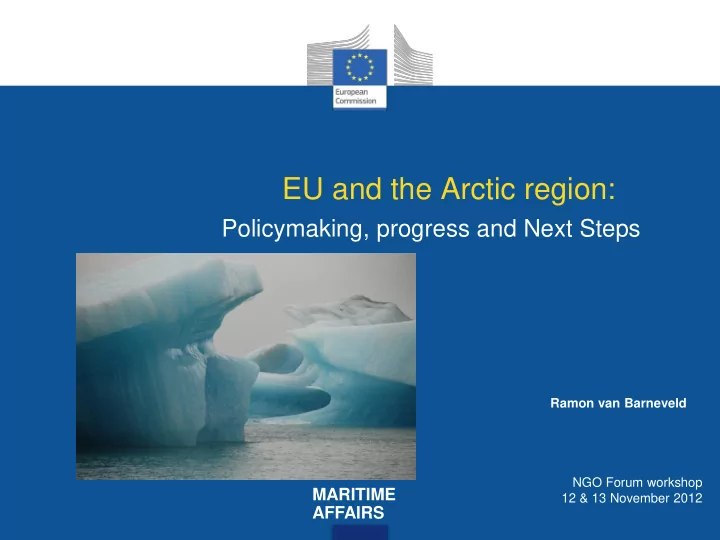

MARITIME MARITIME AFFAIRS AFFAIRS EU and the Arctic region: Policymaking, progress and Next Steps Ramon van Barneveld NGO Forum workshop MARITIME 12 & 13 November 2012 AFFAIRS
What is the EU? 27 Member States • Shared values: liberty, democracy, respect for human rights and fundamental freedoms, and the rule of Combined 500 law. population of EU Member million • States Largest economic body in the world. • A unique institution – Member States Percent of world’s 7 voluntarily cede national sovereignty in population many areas to carry out common policies and governance. Percent of 30 global GDP • Not a super-state to replace existing states, nor just an organization for Percent of combined international cooperation. 55 worldwide Official Development Assistance
EU institutions The European Commission • 27 Commissioners, representing the European perspective, each responsible for a specific policy area. • EU’s executive branch proposes legislation, manages Union’s day - to-day business and budget, and enforces rules. • Negotiates trade agreements and manages Europe’s multilateral development cooperation. The European Parliament Voice of European citizens – members elected for five-year terms. With the Council, passes EU laws and adopts EU budgets. Scrutinises EU institutions.
EU institutions (cont.) Council of the EU EU’s main decision -making body, comprised of ministers of 27 Member States, representing Member State’s point of view. Decides on foreign policy issues. Council presidency rotates among Member States every six months. Court of Justice of the EU Highest EU judicial authority. Ensures all EU laws are interpreted and applied correctly and uniformly. Can act as an independent policy maker but can only deal with matters covered by the Treaties.
Why Arctic?
The Arctic is changing… and fast
And opportunities abound…
But not without risks…
Circumpolar cooperation
EU’s objectives Protecting and preserving the Arctic in unison with its population Promoting sustainable use of resources Contributing to Arctic cooperation
EU’s contribution to date: Climate • On track for Kyoto • 20% CO2 reduction by 2020 • 80-95% reduction by 2050
EU’s contribution to date: Arctic footprint • 59% of black carbon • 57% of PCB-153 emissions • 42% of SO2 emissions • 39% of fish imports • 27% of Arctic Tourism
EU’s contribution to date: Research € 200 million in support of research activities between 2002 and today
EU’s contribution to date: Development • € 1.14 billion between 2007 and 2013 to develop the economic, social and environmental potential of the Arctic region
EU’s future presence in the Arctic • Knowledge: Contribute to Arctic research • Responsibility : Economic development of the High North for the benefit of local and indigenous communities • Engagement: Close cooperation with the Arctic states
• Thank you for your attention! • ramon.van-barneveld@ec.europa.eu 16 16
Recommend
More recommend